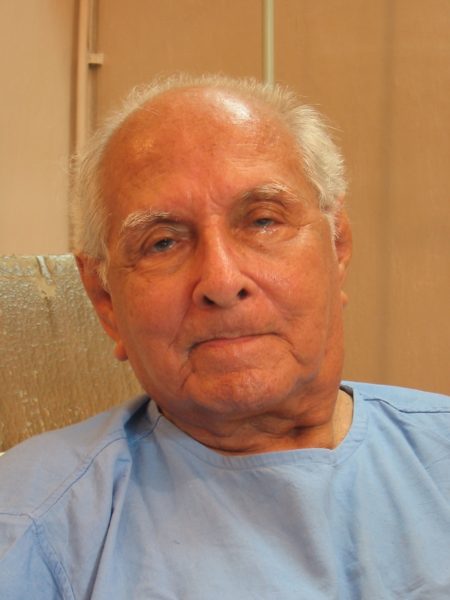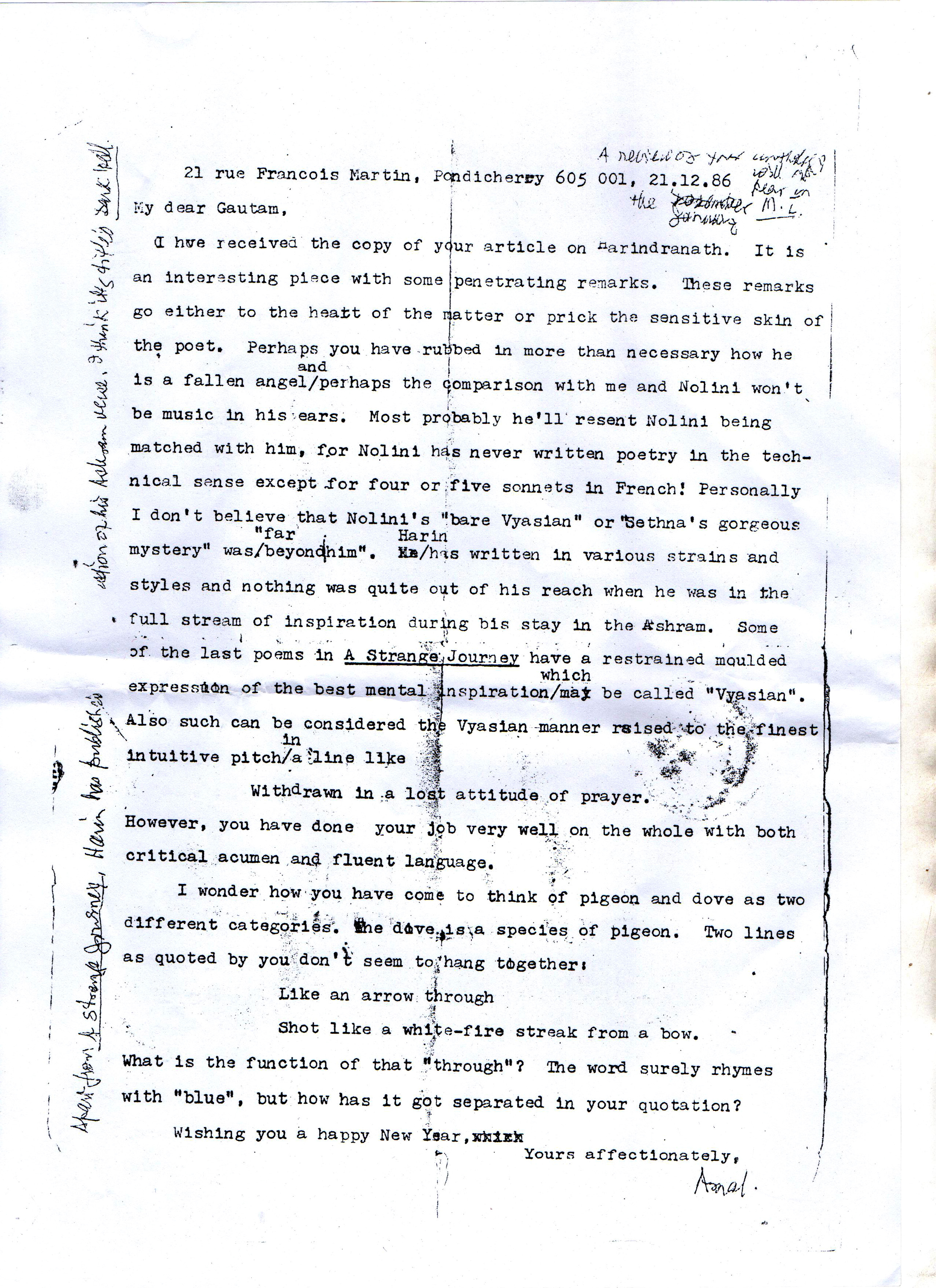
Dear Friends,
K. D. Sethna (25.11.1904 — 29.6.2011) was a Parsi sadhak who joined Sri Aurobindo Ashram at the age of twenty-three in December 1927. He was a noted poet, author, scholar and cultural critic whose published works include more than fifty titles. In 1930 he received the name of Amal Kiran from Sri Aurobindo. He was the editor of the monthly magazine Mother India from the time of its inception in 1949. Some of his notable books are The Secret Splendour, The Poetic Genius of Sri Aurobindo, The Adventure of the Apocalypse, The Passing of Sri Aurobindo: Its Inner Significance and Consequence, The Indian Spirit and the World’s Future, Sri Aurobindo on Shakespeare, The Vision and Work of Sri Aurobindo, Sri Aurobindo—The Poet, Altar and Flame, The Mother: Past-Present-Future, The Problem of Aryan Origin: From an Indian Point of View, Ancient India in a New Light, The Spirituality of the Future: A Search Apropos of R.C. Zaehner’s Study in Sri Aurobindo and Teilhard de Chardin, Aspects of Sri Aurobindo, The Beginning of History for Israel, The Inspiration of Paradise Lost, Problems of Early Christianity, Problems of Ancient India, Our Light and Delight: Recollections of Life with the Mother, Science, Materialism, Mysticism: A Scrutiny of Scientific Thought and The Development of Sri Aurobindo’s Spiritual Thought and the Mother’s Contribution to it.
29 June 2019 marked the eighth death anniversary of K. D. Sethna. As our homage to him, an article titled Years with my mentor: K. D. Sethna penned by Dr. Goutam Ghosal has been published in the website of Overman Foundation.
With warm regards,
Anurag Banerjee
Founder,
Overman Foundation.
Years with my Mentor: K. D. Sethna
Goutam Ghosal
From the early 1980s till when Sethna was shifted to the Ashram Hospital from 21 Rue François Martin, I was in close touch with him, and even beyond that in his initial months in the hospital, although the Clear Ray was incapable of teaching me anything then. Asha-di, then attending on him in the hospital, told me about his frequent shouts at night: “Where is Goutam Ghosal now?” I could hardly believe I was in his mind!
My visits to Pondicherry became frequent from the 80s, four times a year, with a magnetic pull from 21 Rue François Matin. The 4 PM tea at Nirod-da’s room was certainly another fascination. Nirod-da’s first question would be, “Have you met Amal?” With Sethna it was business, learning as much as possible from him the finer issues of Overhead Aesthetics which Sri Aurobindo had passed on to him. He would usually give me time at 9 in the morning. There was “God’s plenty”—from Shakespeare to Blake, from Nissim Ezekiel to P. Lal, from the current issues on Sri Aurobindo, from his own poetry, from Gokak [1] to Iyengar [2], from Harin [3] to Nirodbaran.
Sometimes I would raise the memories of the Sethna-Lal battle of letters of the early 1950s. “Ezekiel is a better poet, Lal is a better person”, he would say quietly looking up the windows to the sky outside through his thick pair of glasses. He would often funnily refer to a customer who had once asked in a Bombay book store, “Do you have the book by Sethna, Shakespeare on Sri Aurobindo?”Meena-di was extremely generous to me even when I was making him tired. That was good luck for me. I was young then and fond of dresses. I watched his bright white shirts stealthily and his bright white socks half-covered by the exotic black belted sandal-shoes.
He would correct my write ups, dictated things for my research and strictly criticised my exuberant essays on the “Satellite poets”. In a letter dated, 21.12. 1986, he criticised my observation on Harin and strongly objected to my calling Harin a “fallen angel”. It will prick “the sensitive skin of the poet”, he cautioned me. Sometimes he would turn personal: “Why do you travel by bus?” he said, “Take the night train to Madras and sleep well.”
Sethna told me he had ceased to write poems after Sri Aurobindo’s passing. “Why?” I asked. “The inspiration had passed away with his passing,” he said. He did write one before collecting The Secret Splendour. That was probably on the “fading rose”, a poem advancing the Yeatsian idea of Rose. He was all praise for my Notes on the Mother’s Prayers and Meditations. I miss him; I miss his friend Nirodbaran who would always press me to go to the hospital to see him. Amaler songe dacha korecho? Have you met Amal? They were the lights of my other days.
 Letter written by K. D. Sethna to Dr. Goutam Ghosal
Letter written by K. D. Sethna to Dr. Goutam Ghosal
*
[1] Gokak : Vinayaka Krishna Gokak (9 August 1909 — 28 April 1992) was a major writer in the Kannada language and a scholar of English and Kannada literatures. He was the fifth writer to be honoured with the Jnanpith Award in 1990 for Kannada language, for his epic Bharatha Sindhu Rashmi.
[2] Iyengar : Kodaganallur Ramaswami Srinivasa Iyengar (17 April 1908 — 15 April 1999), popularly known as K. R. Srinivasa Iyengar, was an Indian writer in English, former vice-chancellor of Andhra University. He was given the prestigious Sahitya Akademi Fellowship in 1985. He then served as vice-president of Sahitya Akademi from 1969 to 1977, and then its acting president from 1977 to 1978. He has served as a member of the Press Council of India, the Board of Governors of the Indian Institute of Advanced Study, Simla from 1970 to 1979 and the CIEFL (Hyderabad) and on the executive of the P. E. N., All India Centre. He was conferred with D. Litt degrees (honoris causa) by Andhra and Sri Venkateswara Universities. His work On the Mother received the Sahitya Akademi annual award in 1980.
[3] Harin : Harindranath Chattopadhyay (2 April 1898 — 23 June 1990) was an Indian English poet, a dramatist, an actor, a musician and a member of the first Lok Sabha from Vijayawada constituency. Younger brother of Sarojini Naidu, his poems were appreciated by Rabindranath Tagore and Sri Aurobindo. The Government of India awarded him the civilian honour of the Padma Bhushan in 1973.
About the author: Poet, critic, translator, Goutam Ghosal, D. Litt, is Professor of English, Visva-Bharati, Santiniketan. A leading interpreter of Sri Aurobindo’s literature, psychology, philosophy and sociological thoughts, he was the chief editor of The Visva-Bharati Quarterly from 2005 to 2007. His major books include The Rainbow Bridge: A Comparative Study of Tagore and Sri Aurobindo, Sri Aurobindo’s Prose Style, Sri Aurobindo and World Literature, Notes of Prayers and Meditations, Notes on the Renaissance, Indian Literature: Points of View and Magic Mirror and Other Poems. Dr. Ghosal has published more than two hundred papers and articles in various journals, especially on Sri Aurobindo and other Indian English poets. His other areas of interest are Shakespeare, Rabindranath Tagore, Stephen Crane and nineteenth century British and American literature.
___________
Touching reminiscence.
Thanks to Goutam Ghosal I met Nirodbaran in 1999.
Dear Anurag- Many thanks for sharing Dr. Goutam Ghosal ‘s memoirs about
” Amal-da” drenchd with warmth and deeper insight – what a wonderful relationship at different level it was – ! I was privileged to hear Amal -da’s talks – Our Light and Delight – in the Hall of Harmony – these talks were absolutely wondrous and his power of narration laced with wit and humour was just incredible – he made the events of his association with the Divine Mother turned vibrantly alive during his interactions with all of us – the fortunate ones –
With best wishes – Surendra s chouhan -SAICE ’69
“Do you have the book by Sethna, Shakespeare on Sri Aurobindo?” Ha..ha…ha. Very funny.
(instead of a book by Sethana, Sri Aurobindo on Shakespeare?)
(By the way, this study reminds of a recent publication from Auroville – “SRI AUROBINDO’S COMMENTARIES ON KRISHNA, BUDDHA, CHRIST AND RAMAKRISHNA – THEIR ROLE IN THE EVOLUTION OF HUMANITY by WILFRIED HUCHZERMEYER”).
Thank you very much, Goutam Ghosal, for this memoir of Amal’da.
“Illustrious mind” fall short of explaining Amal Kiran’s rich, broad, sunlit, multifarious intellectual horizons and poetic gift. He was also extremely cultured person. I met him a quite a few times between 1974 and 1989 and also once communicated with him by post when M.P. Pandit passed away. Only last time, in 1989, I need to take his appointment through his dedicated assistant and caretaker Meena. You can just walk in and talk to him. He will make himself readily available to discuss whatever be the topic – poetry or politics. Renowned writer Paul Brunton (In Search of Secret India fame) had met him during his visit to the Ashram in 1930s and subsequently had correspondence with him. Paul Brunton held him in highest regards among all the inmates of the Ashram.
Anurag, it may be worthwhile to mention here some titles on K.D. Sethna.
K. D. SETHNA (AMAL KIRAN): A CENTENARY TRIBUTE – EDITED BY DR SACHIDANANDA MOHANTY,
K.D.Sethna (An Introduction through Interaction) (2005) by P. Raja,
The Wonder That is K. D. Sethna alias Amal Kiran by Jugal Kishore Mukherjee
Thanks to Aryadeep S Acharya for offering lluminous words to describe the supernal genius of Amal -Da –He has used the wonerful words / expressions to shed the immaculate light on the memoirs —
Surendra s chouhan – SAICE ‘ 69
Since today is Sri Aurobindo’s birthday, I post here what I wrote on Auronet – Auroville’s internal website.
“There is a book “Sri Aurobindo on Shakespeare” by K.D. Sethna (Amal Kiran). However, K. D. Sethna would often funnily remember how a customer who had once asked in a Bombay book store, “Do you have the book by Sethna, Shakespeare on Sri Aurobindo?”
This humorous anecdote has a very interesting dimension. Let us ask a hypothetical question: “What would Shakespeare write about Sri Aurobindo?”
Each one who is familiar with some works of Shakespear can try in his or her own way.
As for me, having got the glimpses of a few of his sonnets, the lines that come to me in the Shakespearan style, as I write this, are as follow:
“This wave from the sky
This lion-soul,
This lustrous lotus in the mud
This embodied future
Doth thou spare a calm regard, a quiet devotion
Lest thou waste thy days
Passing as stone
the goldmine – the jewels of charm supernal.”
However, I also recall that a poem by Peter Heehs, published way back in1974, in the Mother India magazine, in his earlier avatar, when he was primarily a seeker and devotee and a poet does, in my view, some justice to my hypothetical question: What Shakespeare would write about Sri Aurobindo?
Since today is Sri Aurobindo’s birthday, I derive pleasure in posting the poem on Auronet.
The title of the poem is “Sri Aurobindo”
“Face of Godhead, beautiful sign of Spirit;
Source and centre, hub of the wheel of being;
Friend and Father, Teacher and Guide and Lover:
Sri Aurobindo.
Bourneless God-mind showing our destined greatness;
Titan Will delivering what thou showest,
Will that stoops down, aiding our petty weakness:
Sri Aurobindo.
Voice that sings sweet songs of the life supernal,
Filled to overflowing with force, whose rhythms
Rend the veil, revealing the naked Wonder:
Sri Aurobindo.
Hero-warrior fighting to found the future,
Splendid stallion galloping forth to battle,
Tireless Draught-horse drawing the ancient burden:
Sri Aurobindo.
Lord, to thee we offer ourselves completely,
Lay down life, mind, body to be transfigured.
May we chant forever thy name, the mantra
Sri Aurobindo